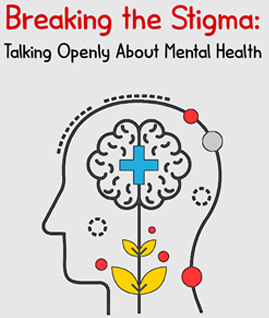
Everyone has encountered that inner voice that occasionally whispers worried ideas or replays unpleasant social exchanges endlessly. Everybody experiences times when their mental health isn’t perfect. However, discussing it openly is still frowned upon for some reason.
The hostility or prejudice that some individuals exhibit toward those who struggle with their mental health can breed prejudice, isolation, shame, and dread. It may also make it difficult for people to ask for assistance, get support, or access resources.
Now is the moment to do that. Though stigma and misconceptions still exist, mental health difficulties are exceedingly common and are nothing to be ashamed of. By starting the dialogue and talking about our experiences, we can work to reduce stigma, raise knowledge of the services available to help people in need and develop a more compassionate society.
Statistics
In India and around the world, mental health problems are a serious public health concern. The World Health Organization (WHO) estimates that more than 322 million people worldwide have some sort of depressive disorder and that more than 14% of Indians experience different types of mental diseases. This portion primarily consists of older adult females from India. According to WHO estimates, around 7.5% of Indians have a mental condition, and they project that number to rise by nearly 20%. 1.03 trillion USD is projected to be lost in economic output between 2012 and 2030 as a result of mental health issues.
These figures illustrate the scope and effects of mental health problems on people and society. They also draw attention to the necessity of raising awareness, preventing, and treating mental health problems in India and around the world.
Breaking the Stigma
Although mental health problems are more widespread than one might imagine, many people suffer in silence as a result of the stigma attached to them. It’s time for us to do that. By discussing mental health openly, we may dispel the assumptions and prejudices that support stigma. We can demonstrate that mental health issues are widespread, curable, and not a cause for shame. We can also increase knowledge of the many forms of mental illness, their causes, and their consequences. This may lessen the stigma-related anxiety and ignorance that are frequently present. Speaking openly about mental health can be advantageous for both one’s own and other people’s well-being. We become more aware of how related we are to one another in this battle as we converse more. Someone else might be inspired by another person’s tale or get the confidence to seek assistance. This might start a helpful cycle of support and communication that would benefit both individuals and communities’ mental health.
Recognizing the Signs
It’s crucial to recognize the symptoms of mental health issues in yourself or someone you care about. The sooner you can recognize signs, the sooner help and therapy can start.
Common indications to watch out for include mood swings, such as persistent melancholy, irritation, or wrath. withdrawing from the friends and social activities you formerly enjoyed because depression or anxiety sometimes causes people to isolate themselves. changes in appetite or sleep. Having trouble focusing or making decisions. Aches and pains in the body with no apparent reason. using drugs or alcohol improperly. thoughts of self-harm or suicide.
Speaking openly about mental health can save lives and help end stigma. The importance of one’s mental health is equal to that of their physical health. Everyone may live their healthiest, happiest lives by recognizing symptoms, initiating kind talks, and getting expert treatment when necessary. We can end the stigma surrounding mental illness by working together.
Support
Supporting someone who has mental health issues can be challenging, but it can also be very rewarding. The most crucial thing someone can do is listen with empathy, allowing others to express their experiences without worrying about being judged or criticized. The better prepared you are to support someone during difficult circumstances, the more you will understand their trigger points. Dispelling myths about mental health involves educating others about it and promoting the elimination of negative stereotypes by being upfront about other people’s struggles.
We may significantly impact others’ lives while they pursue wellness if we have compassion, tolerance, and kindness. Providing support and working to create an accepting culture could just be the two most valuable things one can give.
Rewards of Seeking Treatment and Assistance
Seeking professional help for mental health issues can be challenging but offers numerous benefits. It helps individuals understand their experiences, provide accurate diagnoses, identify underlying conditions, and inform about treatment options. Self-education is crucial, but consulting an expert ensures a comprehensive understanding of mental health. The most significant advantage is feeling healthier, as anxiety or depressive symptoms decrease, quality of life improves, coping mechanisms develop, and awareness of illness increases.
To prioritize mental health, make small adjustments to daily routines and schedules. Self-care practices like meditation, yoga, and outdoor activities can help manage stress and improve overall well-being. Exercises like walking, running, swimming, or weight training can also increase mood and release feel-good hormones that function as natural antidepressants. Even a brief walk during lunch or work breaks can have positive effects. Regular physical activity should be a top priority for optimal mental and physical health.
Break away from the taboo and begin having open conversations about mental health for the sake of both yourself and those close to you. We normalize the topic by sharing our experiences and stories more frequently. Talk to your loved ones and friends; be open to listening without passing judgment. Ask for expert assistance if necessary, and exhort others to do the same. We should band together, support one another through the good times and bad, and work toward creating a society where everyone feels heard, understood, and cared for because mental health affects every one of us at some point. Use your voice and start speaking if you want to change something.